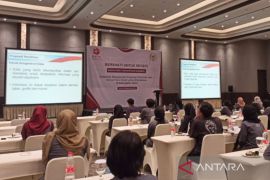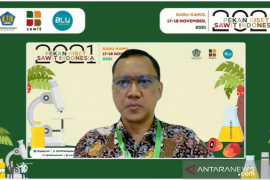"(From) the location of animal slaughter, which have yet to be decontaminated, and then rain allows spores to flow to other places," a researcher from BRIN's Veterinary Research Center, Rahmat Setya Adji, said during a discussion here on Thursday.
There was one incident involving massive anthrax spread in Gorontalo after some locals slaughtered an anthrax-infected animal in a paddy field, he informed.
The animal's blood flowed into the river, triggering anthrax infections in 11 sub-districts in the region, he said.
"From one sub-district, it spread to 11 sub-districts because anthrax bacteria flowed into the river, and then the spores got attached to the grass by the river, and then were carried by farmers (with the grass) to be fed to the animals," he recalled.
Anthrax is a bacterial disease caused by Bacillus anthracis, and it is found among domestic and wild animals, particularly herbivores, he explained.
Related news: Avoid using land infected with anthrax spores: agriculture service
Herbivores can become potential carriers of anthrax and infect humans, Adji said. Anthrax spores are resilient: they can withstand extreme environments, acidity, heat, and can survive for 150 to 200 years, he added.
To tackle the disease, animals need to be vaccinated. Should the bacteria infect humans, antibiotics to improve immunity need to be consumed.
Adji suggested boiling meat for 30 minutes before consuming it since anthrax bacteria are vulnerable to wet heat. When it comes to dry heat, like the process used to make satay, the meat must be cooked for 1 hour at 120 degrees Celsius, he added.
Currently, the central government, through the Agriculture Ministry, is pursuing vaccinations and surveillance of farm animals to control the spread of anthrax in Indonesia.
Prevention and control measures are being conducted by offering vaccinations for animals in endemic areas, controlling the movement of animals from an endemic to a clean area, and disposing of infected animals.
Related news: Anthrax proof of human-animal health link: Health Minister
Related news: Jakarta issues policy banning shipping of livestock from anthrax areas
Translator: Sugiharto Purnama, Mecca Yumna
Editor: Yuni Arisandy Sinaga
Copyright © ANTARA 2023












